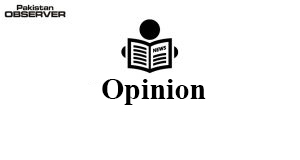Articles and letters may be edited for the purposes of clarity and space. They are published in good faith with a view to enlightening all the stakeholders. However, the contents of these writings may not necessarily match the views of the newspaper.
Be aware
People are usually aware of the benefits of internet but very few know its dark side. Online risk is a global phenomenon; however, from Pakistan’s perspective we face additional challenges e.g. uploading/posting of blasphemous and sectarian content. These are sensitive subjects and require particular consideration to avoid propagation of hate speech.
Keeping in view the gravity of the matter, it is imperative to sensitize our social media users (i.e. youngsters, parents, teachers and other key stakeholders) about the issues and timely adoption of proper measures to save our generation from further harm. In order to achieve the desired results, a collective effort is required to be made by all stakeholders.
Youngsters are vulnerable in the online world and parents/guardians supervising them are not fully aware about online risks, community guidelines of Social Media platforms and punishments mentioned in local laws (i.e. PECA, PPC etc). Parents and teachers need to be watchful of their kids/students online activities especially if they are exhibiting aggressive behaviour, usually resulting from seeing inappropriate content or playing online fighting/war games. Kids/students at this stage require proper counselling by their parents/teachers.
Most importantly, parents must spare time for their children, be friendly and educate them about online risks and allow them to discuss their issues without judgment otherwise, they may confide in strangers/online predators.
Educational institutions should also step up and raise awareness through organizing seminars/webinars, workshops etc. It is important to mention that all popular SM companies and their systems are hosted outside Pakistan on encrypted HTTPs sites.
PTA after analyzing the received complaints takes up the matter with concerned SM platform for removal/blocking of reported content. For quick resolution of the matter, SM platforms always prefer direct communication with complainant since it is easier to seek further information (if required) directly from complainant.
MUHAMMAD FAROOQ
Via email
Who is responsible?
Although Karachi is mostly under the control of the provincial government and the Mayor of Karachi, the people who are actually responsible for Karachi’s current condition, are actually…us. Almost every Karachiite nowadays will blame the above-mentioned authorities and others. What they don’t realize is that Karachi is the way it is due to themselves.
Most of the people living in Karachi don’t care about their city and just come here to earn money. Everyone is very selfish in what they do. People wake up in the morning, go to their respective offices, come back in the evening, eat, sleep, wake up and this repeats every day and has been for more than years. As Karachi’s emerging generation has grown in this environment of selfishness seeing people around us just complaining and pointing fingers at everyone except themselves.
What Karachiites should do but don’t is that they should start caring about their city a little more by raising their voices against the undeniable and obvious negligence and corruption done. The people of Karachi should take to the streets to protest against this unparalleled lack of development and attention.
Instead, all we do is sit on sofas in front of TVs and blame everyone. To be honest, if Karachiites had taken the streets earlier, they wouldn’t be living in one of the least unliveable cities in the world. Karachiites don’t take a stand due to selfishness and carelessness about their city, “As Ghulam Mustafa Jatoi said, that no development project or loan under Mr. 10 Percent can take place without at least 10% of it going in his back pocket.” We fully intend to take a stand against this negligence and hope that the Almighty will help us achieve our goal and turn the plight of Karachi into something more favourable for us.
SABIHA ABID
Via email
Drug addiction in poor society
Drug addiction among the poor and lower middle class is even more than the upper class in Pakistan. This addiction has gone to the extent that most of the poor begging on streets are drug addicts. Pakistan ranks the second most addicted country in the world in using drugs. It is due to the very large population of extremely poor. The country is suffering extensively from different types of drug addictions. Yet, no special arrangements have been made by the concerned authorities to stop the drug addiction among poor and save everyone from this epidemic.
Although drugs are not free or legally available that everyone can easily buy them. Some of the drugs are highly expensive that not everyone can buy them. Still, the poor class who has no money to fulfil their basic needs of life manages to find drugs daily.
Drug addicts have no life to live. Their health and education all go in vain when they start doing drugs. After the destruction of their personal life, many are kicked out of there homes and they come on the streets. To still fulfil their addiction, some start crimes and become thieves and robbers. Some are compelled to beg on roadsides, in front of religious sites and shrines.
Poverty is not a determining factor of drug use, however, someone who lives in poverty is more likely to use drugs than someone who can provide adequately for all their needs.
SHEHZADI BALOCH
Karachi










